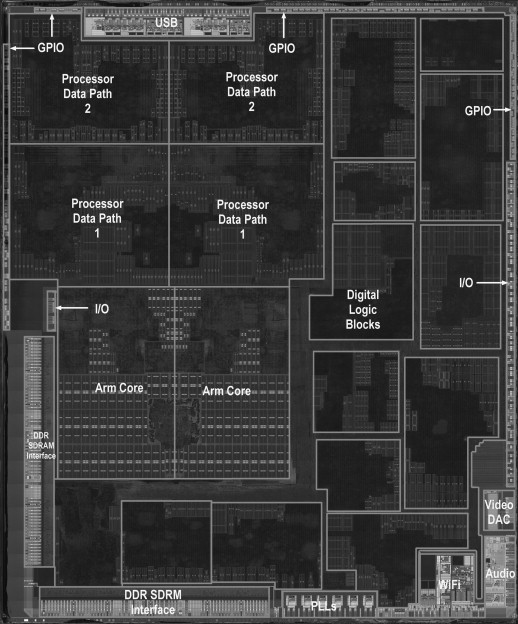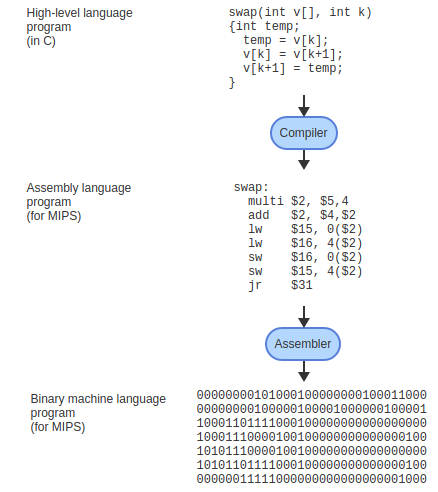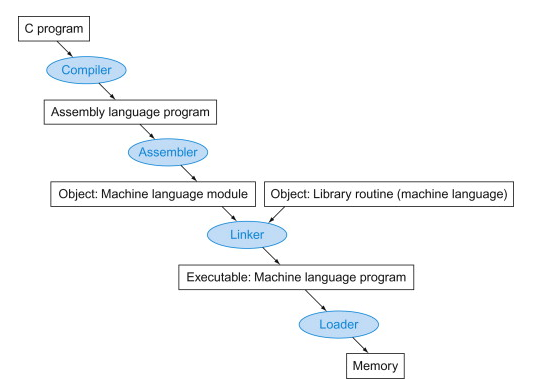# Using the Command Line --- CS 130 // 2021-09-01 <!--=====================================================================--> ## Administrivia - Your assignment 1 questionnaire should have been turned in before class - <!-- .element: class="fragment"--> The CS Desktop is still having troubles... + I recommend that all of you [install GCC and VSCode natively](/teaching/2021f/cs130/resources/installing-visual-studio-code) - <!-- .element: class="fragment"--> If you're still having trouble compiling and running C code after today, please [schedule an appointment](https://calendly.com/titus-klinge) with me in my office hours <!--=====================================================================--> # Questions ## ...about anything? <!--=====================================================================--> ## Overarching Theme - Learning how a high-level program is actually executed on your computer's processor <!---------------------------------->  <!---------------------------------->  <!--=====================================================================--> # Command Line Interfaces <!-- .slide: data-background="#004477" --> <!--=====================================================================--> ## Command Line Interfaces - A **command line** is a *textual* interface to your computer + <!-- .element: class="fragment"--> Also called a **Terminal** + <!-- .element: class="fragment"--> Also called a **Shell** - <!-- .element: class="fragment"--> A terminal is similar to a file browser such as Windows Explorer or MacOS Finder <!----------------------------------> ## Command Line Interfaces - Each OS has their own version of a terminal + <!-- .element: class="fragment"--> **PowerShell** is primarily used on Windows 10 + <!-- .element: class="fragment"--> **Command Prompt** another Windows terminal primarily used on older versions of Windows + <!-- .element: class="fragment"--> **Terminal** is the app on MacOS <!--=====================================================================--> ## Basics of a CLI - `pwd` + Prints the **working directory** - <!-- .element: class="fragment"--> `cd new_directory` + Changes the working directory to `new_directory` - <!-- .element: class="fragment"--> `ls`: + Lists the files and folders in the working directory <!----------------------------------> ## Basics of a CLU - Notice that a pattern has emerged... - <!-- .element: class="fragment"--> All commands are of the form: + `command arg1 arg2 ...` - <!-- .element: class="fragment"--> Here `command` is a program - <!-- .element: class="fragment"--> `arg1`, `arg2`, etc. are the **command line arguments** to the program <!--=====================================================================--> ## Example: Using Python - Consider the Python program `hello.py`: ```py def main(): print("Hello, world!") if __name__ == "__main__": main() ``` - <!-- .element: class="fragment"--> We can run this program on the CLI by executing ```shell $ python3 hello.py ``` - <!-- .element: class="fragment"--> `$` is the **prompt** and is not meant to be typed in + <!-- .element: class="fragment"--> On Windows, the prompt is a `>` character <!----------------------------------> ## Example: Using Args - Consider the Python program `greet.py`: ```py import sys def main(): if len(sys.argv) == 2: name = sys.argv[1] print(f"Hello, {name}!") elif len(sys.argv) == 1: print("No name was provided!") else: print("Too many args!") if __name__ == "__main__": main() ``` <!----------------------------------> ## Example: Java Args - Consider the equivalent program `Greet.java`: ```java public class Greet { public static void main(String[] args) { String message; if (args.length == 1) { message = "Hello, " + args[0] + "!"; } else if (args.length == 0) { message = "No name was provided!"; } else { message = "Too many args!"; } System.out.println(message); } } ``` <!--=====================================================================--> ## Why Learn to Use a CLI? - As programmers, it is sometimes very convenient to write programs that interact with the user via CLI + <!-- .element: class="fragment"--> Logging state of the program for debugging + <!-- .element: class="fragment"--> Get textual input for later use - <!-- .element: class="fragment"--> Once you build up familiarity using a CLI, you will find that certain tasks are **much easier** on the command line <!--=====================================================================--> # Demo <!-- .slide: data-background="#004477" --> <!--=====================================================================--> ## More Basic Commands ```bash cd directory_name # change directory ls # list files/folders pwd # print working directory mkdir directory_name # make directory mv dir1 dir2 # move/rename directory mv file1 file2 # move/rename file rm file # remove file rm -r directory # remove directory (recursively) ``` <!----------------------------------> ## Other Useful Facts - `.` is an alias for **current directory** + `./program` means: "execute the `program` file that is in this directory" - <!-- .element: class="fragment"--> `..` is an alias for **parent directory** + e.g., `cd ..` means: "go up one directory" - <!-- .element: class="fragment"--> Most CLI programs have an optional argument named `--help` ```shell gcc --help ``` <!--=====================================================================--> ## PowerShell VS Bash - Linux and MacOS both use **bash** terminals, which have standardized commands - However, Windows PowerShell is **entirely different** but is gracious enough to support the basic CLI commands we've covered today + <!-- .element: class="fragment"--> The easiest way to get a bash terminal on Windows 10 is to install the [Windows Subsystem for Linux](https://docs.microsoft.com/en-us/windows/wsl/install-win10) (WSL) + <!-- .element: class="fragment"--> This is **not** required for this course, but WSL is becoming widely used in industry <!--=====================================================================--> ## Using GCC and VSCode - I **highly recommend** creating a folder on your computer and opening it inside VSCode + <!-- .element: class="fragment"--> File -> Open Folder - <!-- .element: class="fragment"--> When you have a folder opened in VSCode, the terminal's working directory is automatically initialized to the open folder <!--=====================================================================--> # Overview of C <!-- .slide: data-background="#004477" --> <!--=====================================================================--> ## Why learn C? - C is the most commonly used programming language in the world <!----------------------------------> <!-- .slide: data-background-iframe="https://www.tiobe.com/tiobe-index/" data-background-interactive --> <!----------------------------------> ## Why learn C? - C is the most commonly used programming language in the world - Applications are still written in C + Linux kernel, Windows, drivers, video games, ... <!--=====================================================================--> ## C Design Background - C was originally designed in the 1970s + At the time, computers were not very powerful and had limited memory - <!-- .element: class="fragment"--> C was designed to be **efficient** + But still ridiculously convenient in comparison to programming in assembly - <!-- .element: class="fragment"--> "The programmer is always right" + There is very little error checking + <!-- .element: class="fragment"--> Error messages are usually no help at all <!--=====================================================================--> ## Interpreted VS Compiled - Python is an **interpreted** language + A `program.py` is fed into an **interpreter** which executes it directly - <!-- .element: class="fragment"--> C is a **compiled** language + `program.c` is fed into a **compiler** which produces an executable file + <!-- .element: class="fragment"--> This executable is custom to your OS and CPU - <!-- .element: class="fragment"--> For Java, `program.java` is compiled into "Java bytecode" which is then interpreted by the Java Virtual Machine (JVM) <!----------------------------------> ## Random Trivia - What language is the Python interpeter written in? + <!-- .element: class="fragment"--> C - <!-- .element: class="fragment"--> What language is the JVM written in? + <!-- .element: class="fragment"--> C - <!-- .element: class="fragment"--> What language is the C compiler written in? + <!-- .element: class="fragment"--> C <!--=====================================================================--> ## Compiler Diagram <div class="twocolumn"> <div style="font-size: 80%"> - **Compiler**: Converts C into assembly language - **Assembler**: Converts assembly into machine code - **Linker**: Combines machine code files into an executable - **Loader**: Loads an executable into memory and executes it </div> <div>  </div> </div> <!--=====================================================================--> # C Progams <!-- .slide: data-background="#004477" --> <!--=====================================================================--> ## An Example ```c #include "stdio.h" int main() { char name[20]; int age; printf("Hi! What is your name?\n"); scanf("%s", name); printf("Hello, %s, it is nice to meet you!\n", name); printf("What is your age?\n"); scanf("%d", &age); printf("Wow, %d is pretty old!\n", age); return 0; } ``` ```py # Python equivalent name = input("Hi! What is your name?\n") print("Hello,", name, "it is nice to meet you!") age = int(input("What is your age?\n")) print("Wow,", age, "is pretty old!") ``` <!--=====================================================================--> ## Variables and Types - In C, the **type** of a variable must be declared before it is first used ```c int x = 3 + 4; // Must give a type the first time ... x = x + 1; ``` <!----------------------------------> ## Variables and Types - Integers ```c int x = 5; // usually 32-bits long y = -13; // usually 64-bits short z = 7; // usually 16-bits unsigned int u = 7; // makes number interpreted as positive ``` - <!-- .element: class="fragment"--> Floating point ```c float f = 3.14; // usually 32-bits double d = -7.123; // usually 64-bits ``` <!-- .element: class="fragment"--> <!----------------------------------> ## Variables and Types - Character ```c char c = 'a'; // usually 8-bits ``` - <!-- .element: class="fragment"--> No Boolean type---uses `int` instead + `0` means false + Any other `int` is true <!--=====================================================================--> ## Comments - Uses `/* ... */` for multi-line comments - Uses `// ...` for single-line comments ```c /* This is a comment that spans multiple lines. Everything in-between is ignored */ int x = 10; // This is a single line comment. x = x + 5; // Everything after it is ignored. ``` <!--=====================================================================--> ## Operators - C uses symbols `||`, `&&`, and `!` for Boolean expressions instead of `and`, `or`, and `not` ```py # Python code result = ((a > 0 or b > 0) and (c > 0)) == False ``` ```c int result = ((a > 0 || b > 0) && c > 0) == 0; ``` <!----------------------------------> ## Operators - `a / b` behaves differently in C + Does **integer division** if both are integral + Does **floating point division** if one or both are floating point <!--=====================================================================--> ## For Loops - In C, the `for` loop means something else entirely - The following two code blocks are equivalent ```c for (init; test; update) { body } ``` ```c init while (test) { body update } ``` <!----------------------------------> ## For Loops - A common use is to iterate through an array ```c int arr[5] = {7, 3, 1, 2, 10}; for (int i = 0; i < 5; i++) { printf("The next value is: %d\n", arr[i]); } ``` ```py arr = [7, 3, 1, 2, 10] for i in range(10): print("The next value is:", arr[i]) ``` <!--=====================================================================--> ## Arrays - Fixed size---they cannot be made smaller or larger - <!-- .element: class="fragment"--> No way to check its size after creation - <!-- .element: class="fragment"--> No index out of bounds checks ```c int arr[50]; // creates an array with 50 spots int val = arr[60]; // will happily try to do this printf("%d", val); ``` <!-- .element: class="fragment"--> <!--=====================================================================--> ## Functions ```c void swap(int v[], int k) { int temp = v[k]; v[k] = v[k+1]; v[k+1] = temp; } void sort (int v[], int n) { for (int i = 0; i < n; i++) { for (int j = i - 1; j >= 0 && v[j] > v[j + 1]; j--) { swap(v, j); } } } ``` <!--=====================================================================--> ## Exercises - Start by setting up **Visual Studio Code** on your computer - You will need the [C/C++ extension](https://marketplace.visualstudio.com/items?itemName=ms-vscode.cpptools) - If you are running Windows, you will also to follow the [Using GCC with MinGW](https://code.visualstudio.com/docs/cpp/config-mingw) tutorial to install the C compiler <!----------------------------------> ## Exercise 1 - Write a program that asks the users to type in four numbers and prints the average of those four numbers <!----------------------------------> ## Exercise 2 - Create a function `void reverse(int arr[], int n)` that takes an array with `n` elements and reverses the order of the elements - Test it out in a `main` function such as: ```c int main() { int arr[5] = {1, 2, 3, 4, 5}; reverse(arr, 5); for (int i = 0; i < 5; i++) { printf("The next value is: %d\n", arr[i]); } return 0; } ```